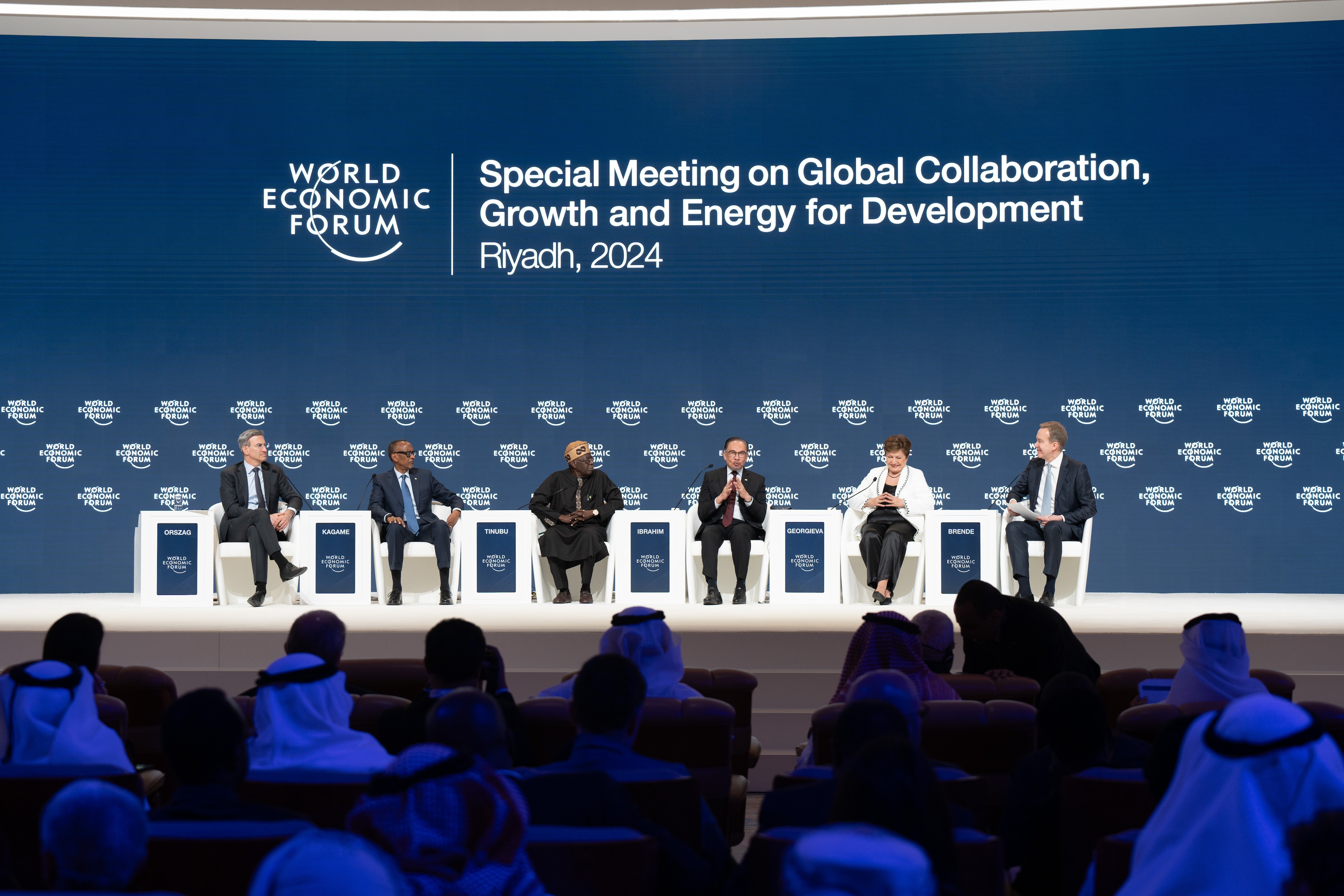Here’s why 2023 could become a turning point for the energy transition

2023 could become a turning point for the energy transition, according to a new report from Generation Investment Management. Image: Unsplash/fresonneveld

Get involved with our crowdsourced digital platform to deliver impact at scale
Stay up to date:
Davos Agenda
Listen to the article
- 2023 could become a turning point for the energy transition, according to a new report from Generation Investment Management.
- Ahead of the World Economic Forum’s Sustainable Development Impact Meetings 2023, the report provides an overview of current trends and recommendations for the world’s path to sustainability.
- While significant progress has been made in many sectors, much remains off-target, not least a fair transition for both the developed and the developing world.
The year 2023 may be remembered as the year when the energy transition finally came into the focus of global politics. This is according to the latest annual Sustainability Trends Report 2023 from Generation Investment Management, a sustainable investor chaired by former US Vice President Al Gore. It’s the result of both a greater societal commitment to tackling the climate crisis and the impact of the energy crisis caused by the war in Ukraine, which made the search for energy independence a top priority for policymakers.
Yet, despite notable progress, the report highlights that we are still some way off-target. Global temperatures have continued to rise and accelerating the energy transition is often a source of controversy.

As the World Economic Forum prepares for its Sustainable Development Impact Meetings 2023 in New York from 18-22 September, we look at the trends and recommendations put forward by Generation in more detail.
How is the World Economic Forum facilitating the transition to clean energy?
Change in power
With power as one of the main sources of CO2 emissions (34%), moving power generation from fossil fuels to renewable energy sources is one of the crucial objectives of the energy transition. Generation argues that the world is close to the point when emissions from electricity grids will peak and start to drop as renewables like solar and wind as well as other clean energy sources continue to grow and fossil fuels’ share in the energy mix tapers off.
However, there continues to be a marked difference between developed and developing countries: while electricity-related emissions in the former have fallen relatively consistently since the turn of the century, the latter has experienced a substantial increase in emissions.
While solar power was the star performer among renewables in 2022, achieving an installation record, backlogs for connecting to the grid have held up progress for renewable energy developers. At the heart of the issue is a lag in expanding power lines – a bottleneck governments need to address urgently, the report says.
Taking the heat out of buildings
Buildings are directly responsible for only 6% of global CO2 emissions – largely from gas-powered space and water heating – but they still rank among the biggest emitting sectors worldwide. This is because, when considering their indirect emissions from electricity usage, the figure triples.
What is more, the sector has made little progress, with emissions plateauing in the past couple of years.
The issue is not just down to old buildings that require high amounts of energy for heating and cooling. Due to cost, even new buildings are often not as energy-efficient as they could be. The report advocates more stringent construction regulations and enforcement to overcome resistance within the industry. In developing markets, the suggestion is a tie-in with development aid to enforce better construction standards.
That said, Generation acknowledges that where stricter building codes and regulations are being introduced, they have frequently led to controversy. The lengthy debate over abolishing gas boilers in Germany and opposition to wind and solar farms in the US are recent examples of this.
Decarbonizing industry
Responsible for 24% of global carbon emissions, industry is one of the sectors that struggles the most with weaning itself off fossil fuels. Steel, cement, chemical fertilizers and plastics manufacturing all cause high emissions due to their use of coal and gas for industrial heat and as a feedstock.
Generation’s report states that while little progress has been made to date, governments are starting to put policies in place to support technologies such as clean hydrogen production. Hydrogen burns CO2-free and can be made with low-carbon and carbon-free methods, but these are still high-cost. With clean hydrogen projects mushrooming, the report suggests that favourable policies such as the American climate law and ‘buy clean’ policies could improve those economics.
What is the World Economic Forum doing to help companies reduce carbon emissions?
Electrifying transportation
Transportation is another major culprit when it comes to CO2 emissions. While aviation and shipping contribute to this to some extent, nearly three-quarters of transport emissions in 2022 were from road transport, according to the International Energy Agency (IEA).
Electric vehicles are one answer. But although their share in the global market for new cars has come on in leaps and bounds, their adoption still faces many barriers. These range from a lack of charging infrastructure to a dearth of the critical minerals needed to make batteries and a need for effective battery recycling.
What is more, electrifying cars is only one part of the equation. Road haulage, ships and planes are all in search of alternative power sources, and electrification may only be of limited use to them. Sustainable aviation fuel may become airlines’ best alternative, while shipping may move to ammonia as its fuel of choice, the report suggests.
Alongside, improving public transport, introducing congestion charging in cities, and turning over streets to pedestrians and cyclists will be important to decarbonizing the world’s roads.
Protecting biodiversity
More than a fifth (22%) of emissions can be attributed to land and food production. Reducing these emissions is closely linked to maintaining and restoring biodiversity. That includes putting a halt to forests and land being given over to food or commodity production, as well as protecting the world’s plants, animals and other organisms.
The EU is among those who have legislated against importing products of deforestation, while ‘forest’ countries such as Brazil – which has a chequered history when it comes to deforestation policies – are increasingly investing in protecting them. Investors and corporates are also starting to put pressure on companies to eliminate suppliers that don’t protect the natural environment.
One major contributor to deforestation is food production, especially red meat and commodities such as chocolate and coffee. Here, the report finds that less progress has been made – not least because demand is continuing to grow.
To avoid a further ‘land grab’ for food production, farmers must produce greater yields from the same size of farmland. This requires fertilizers and other agricultural inputs to be rolled out more widely, but these, in turn, can have a significant carbon footprint. Developing alternative approaches to eliminate this risk is essential and needs to be invested in, Generation says.
A $5 trillion investment opportunity
Today, 70% more investment flows into clean energy than into fossil fuels, according to the IEA. But that is far from enough both in terms of volume and where those investments are directed.
Today’s volumes need to triple to approach $5 trillion a year if we are to meet the goals of the Paris accord and the investments need to be spread out more evenly across industries and across the planet. Developing countries in particular must be enabled to leapfrog fossil fuels rather than follow the example of the developed world. Climate-led investments that combine a high climate impact – eg, the removal of emissions at scale – with attractive risk-adjusted returns for investors may be one way of achieving this.
As COP28 in Dubai approaches, the Sustainability Trends Report 2023 concludes that the developed economies hold the key to helping developing countries make the energy transition work.
Don't miss any update on this topic
Create a free account and access your personalized content collection with our latest publications and analyses.
License and Republishing
World Economic Forum articles may be republished in accordance with the Creative Commons Attribution-NonCommercial-NoDerivatives 4.0 International Public License, and in accordance with our Terms of Use.
The views expressed in this article are those of the author alone and not the World Economic Forum.
Related topics:
The Agenda Weekly
A weekly update of the most important issues driving the global agenda
You can unsubscribe at any time using the link in our emails. For more details, review our privacy policy.
More on Forum InstitutionalSee all
Maroun Kairouz
May 3, 2024
Gayle Markovitz
April 28, 2024
Gayle Markovitz
April 27, 2024
Mirek Dušek and Maroun Kairouz
April 27, 2024
Kate Whiting
April 26, 2024
Spencer Feingold and Gayle Markovitz
April 19, 2024













